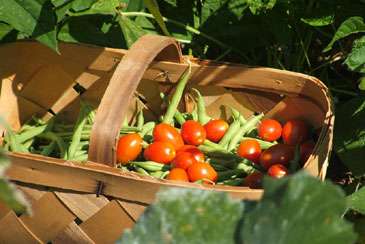Landscaping with a Green Thumb: The Vegetable Garden

In this article, you will find:
Tending your garden
Watering and FertilizingAs a general rule, a vegetable garden requires about one inch of water per week. Put a small tin can in the soil near your plants to serve as a rain gauge. If rainfall is scant, you will have to water your garden deeply once a week. A thorough watering is much better for the plants than a light daily watering, because it encourages good root development. It's best to water early in the day, to avoid problems with fungal diseases. A light mulch of shredded leaves, pine straw, or grass clippings will help the soil retain moisture.
Rain barrels are an ancient concept that is enjoying a revival in earth-friendly gardens. You can purchase a 50 or 100 gallon rain barrel and direct your gutter downspout into it. One inch of rainfall on a 1,000 square foot roof will produce 500 gallons of water! Plus, all of this free water is untreated—no chlorine, fluoride, or other chemicals—and you are providing relief to your sewer or septic system. Note that your barrel should be childproof and inaccessible to mosquitoes. It must have a spigot at the bottom of the barrel, to which you can connect a hose. It should also have an overflow valve so that excess water can be diverted once the rain barrel is full. You can minimize leaves and debris in the water by placing a screen at the top of your downspout.
The best fertilizers for an organic vegetable garden are well-aged animal manure (from non-meat-eating animals like cows, horses, or chickens), and compost or compost tea. Apply manures early in the season, before planting; use compost as a side dressing and compost tea as a liquid fertilizer throughout the season. Don't use chemical fertilizers—they harm both soil structure and microbiotic life.
Pest Problems
At the first sign of pests, you may be tempted to start spraying some noxious chemical, but there are effective organic sprays for dealing with pests, many of which you can make yourself. You can find recipes for soap spray, salt spray, buttermilk and flour spray, garlic spray, and tobacco spray. You can also purchase organic treatments from a number of online stores and some garden centers. Don't compromise your vegetables and soil with toxins. Remember, those vegetables are destined for your dinner table!
Related articles:
The Ornamental Garden
The Organic Lawn
Composting

